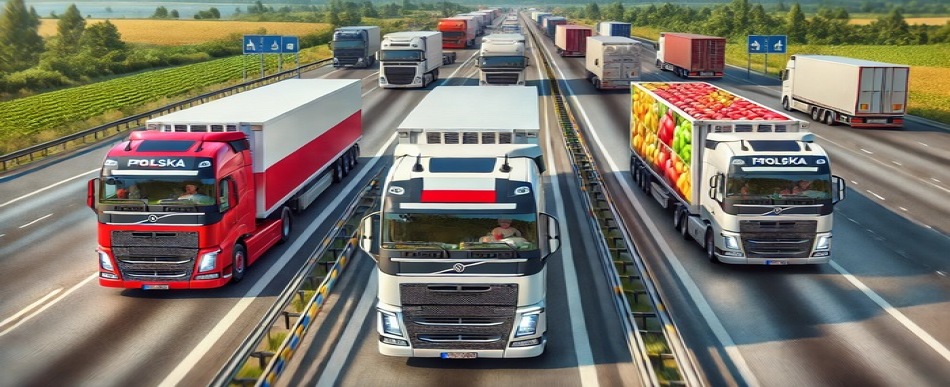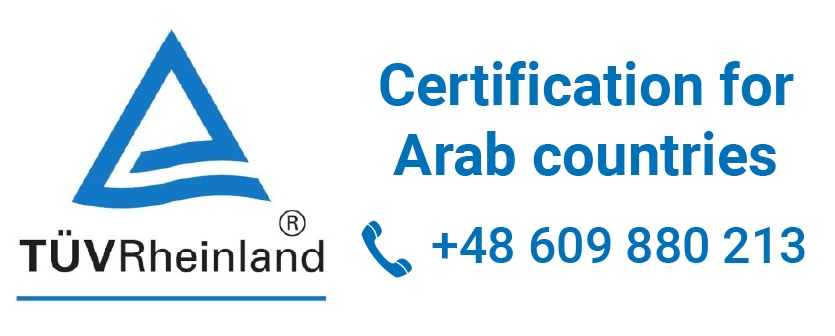Transport to Poland. Transport from Poland. Transport within Poland
Why do Polish transport companies dominate the European logistics market?
Polish international transport is the foundation of European logistics and the supply chain, as evidenced by data showing its significant share in the transportation of goods across Europe. For example, Polish transport companies handle a considerable portion of traffic between Eastern and Western Europe and play a key role in deliveries to Scandinavian and Southern European markets, making them an indispensable element of the European economy. Polish companies in the TSL sector (Transport-Shipping-Logistics) have long been recognized as reliable, innovative, and professional partners on global markets. The dynamic growth of this industry is made possible by Poland's strategic location in the heart of Europe and consistent investments in modern technologies, infrastructure, and service quality improvements. The operations of Polish transport companies are driven by a pursuit of perfection and efficiency, making them one of the most important players in European logistics.
Competitiveness and Innovations in Polish Transport
One of the greatest strengths of Polish transport companies is their cost competitiveness, combined with the highest standards of service. Polish carriers use advanced technologies, such as telematic systems and artificial intelligence, to optimize routes and operational costs. This enables them to provide top-level services while minimizing transport time and reducing costs. Polish transport firms also focus on continuously improving their personnel's qualifications, resulting in higher-quality execution of orders and building strong relationships with clients. Their deep knowledge of European market specifics allows Polish companies to tailor their offerings to the individual needs of international partners.
Modern Infrastructure and Vehicle Fleets in Polish Transport Companies
The Polish TSL sector is also distinguished by its modern infrastructure and innovative vehicle fleets. Companies invest in eco-friendly trucks meeting the highest emission standards, addressing global challenges related to sustainable development. Many Polish transport firms operate fleets designed to handle various types of cargo, including oversized goods and those requiring special conditions, such as temperature-controlled transport. Investments in infrastructure also include strategically located logistics centers and warehouses, which significantly streamline the flow of goods and enhance delivery efficiency.
Qualified Personnel as a Key to Success
The success of Polish transport companies is also due to their highly qualified workforce of drivers and logisticians. Drivers are specialists with extensive experience, well-versed in European routes and international regulations. Specialized training enables them to safely and efficiently utilize advanced technologies, manage working hours, and adhere to the highest safety standards. Logisticians, on the other hand, ensure precise planning and execution of every stage of transport, minimizing the risk of delays and optimizing costs. Polish transport firms are increasingly collaborating with international logistics teams worldwide, enhancing their competitiveness in global markets.
Legal Stability and Digitalization in Polish Logistics
Legal stability and compliance with EU standards are additional strong points of the Polish TSL sector. Polish transport companies operate in accordance with European Union regulations, ensuring fairness and transparency in cooperation. Certifications such as ISO 9001 or HACCP confirm their professionalism and attention to detail. The growing application of digitalization in logistics, including electronic documentation and process management platforms, facilitates cooperation with international partners and streamlines service delivery.
Versatility of Polish Transport Companies
The flexibility of Polish transport companies is another advantage. Polish carriers offer comprehensive solutions for road, rail, sea, and air freight transport. Additional services, such as full customs clearance for imports and exports, shipment consolidation, or express deliveries, enable Polish companies to meet even the most demanding expectations of international clients. Such versatility makes Poland an excellent transport partner for businesses across various industries worldwide.
Poland – Europe's Strategic Logistics Hub
Poland’s strategic location plays a pivotal role in the European logistics network, bringing numerous benefits to both domestic and international transport. Poland's position at the crossroads of major European trade routes shortens transit times between East and West, as well as reduces logistics costs for companies utilizing Polish infrastructure. Additionally, the proximity of seaports in Gdańsk and Gdynia enables efficient distribution of goods to Scandinavian and global markets, making Poland an attractive logistics partner on a global scale. The country hosts key transport routes linking East with West and North with South. The A1 motorway, known as the “Amber Highway,” connects southern Poland with the Baltic Sea coast, providing quick access to the ports in Gdańsk and Gdynia. The A2 motorway, running west to east, serves as a critical link between Germany, Poland, and Eastern Europe. Meanwhile, the A4 motorway, traversing southern Poland, supports trade between Germany and Ukraine. Expressways like S3 and S8 further enhance the transportation network, ensuring efficient connections in all directions.
Road Safety as a Priority for the Transport Industry
Road safety is a top priority for the Polish transport industry. To improve it, transport companies invest in advanced vehicle monitoring systems, driver training on safe driving techniques, and regular fleet maintenance. They also collaborate with institutions responsible for road safety to implement innovative solutions such as intelligent traffic management systems and hazard warning systems. These efforts reduce the number of accidents and improve road conditions. Modernizing infrastructure, installing intelligent traffic management systems, and adopting new technological solutions contribute to enhanced safety. Legal regulations governing driver working hours aim to minimize fatigue, thereby increasing road safety. Collaboration with EU bodies and investments in vehicles meeting the highest environmental standards further support environmental protection and elevate transport standards. The Polish transport and logistics sector thus ensures not only efficiency but also a commitment to safety and sustainable development.
Oversized Transport – Challenges and Opportunities
Oversized transport from Poland and to Poland plays a vital role in delivering specialized cargo, such as industrial machinery, construction elements, or military vehicles. For instance, Polish companies have transported massive wind turbine components to Scandinavian wind farms and heavy military equipment to international NATO bases. These projects highlight the importance of precision, coordination, and reliability in this sector. This demanding segment of logistics requires precise planning and excellent preparation. Polish companies specializing in oversized transport offer comprehensive services, including route analysis, obtaining necessary permits, and coordinating the loading and unloading process. With the use of modern technologies such as monitoring systems and telematics, transport can be tracked at every stage. Collaboration with local authorities and institutions ensures smooth handling of formalities and the organization of escorts for non-standard loads. Oversized transport from Poland is a crucial component of major industrial, energy, and infrastructure projects, contributing to economic development both domestically and abroad. Thanks to their experience and dedication, Polish companies are becoming key partners for international enterprises seeking reliable logistics solutions in oversized transport.
Refrigerated Transport – Precision and Reliability
Refrigerated transport from Poland and to Poland is one of the most demanding yet dynamically growing segments of logistics. This type of transport is particularly crucial for products like fresh fruits, vegetables, dairy, meat, pharmaceuticals, or chemical goods, which require precise temperature control to maintain quality. For instance, Polish companies specializing in refrigerated logistics deliver fresh fruits to Scandinavian markets and transport temperature-sensitive medications to recipients across Europe. Specialized services in this area enable the transport of products requiring controlled temperatures, such as fresh fruits, vegetables, meat, dairy, pharmaceuticals, or chemical goods. Polish transport companies operate fleets of modern refrigerated vehicles equipped with advanced temperature monitoring systems, ensuring proper conditions throughout the journey. This guarantees that products reach their destinations in perfect condition, meeting the highest quality standards.
Key Traffic Regulations on Polish Roads
In Poland, speed limits vary depending on the type of road and vehicle, ensuring safety for all road users. In urban areas, the standard limit is 50 km/h during the day, with an increase to 60 km/h at night, unless otherwise indicated by road signs. Outside urban areas, limits are higher: 90 km/h on single carriageways and 100 km/h on dual carriageways. On single-carriageway expressways, the maximum speed is also 100 km/h, while on dual-carriageway expressways, it increases to 120 km/h. Motorways allow the highest speeds, with a limit of 140 km/h.
Speed limits for heavy vehicles in Poland are stricter than for passenger cars due to their larger size, weight, and longer braking distances. In urban areas, the limit is 50 km/h, with an increase to 60 km/h at night (11:00 PM to 5:00 AM), unless road signs specify otherwise. Outside urban areas, trucks can travel at up to 70 km/h. On expressways, the limit is 80 km/h, regardless of whether the road is single or dual carriageway. Similarly, on motorways, where traffic is most fluid, the speed limit for heavy vehicles is also 80 km/h. These limits are strictly enforced by the appropriate authorities, and truck drivers must comply with regulations regarding maximum speeds based on road type.
Additionally, heavy vehicles are subject to tachograph systems, which record speed, working hours, and rest periods for drivers. This allows regulatory bodies to monitor compliance with rules and ensure vehicles do not exceed permissible speeds. The mandatory use of tachographs, especially in international transport, enhances road safety and promotes fair competition in the transport sector. These regulations align with EU standards, harmonizing rules between Poland and other European countries.

 pl
pl  en
en  de
de  es
es  fr
fr  it
it  pt
pt  ru
ru  sv
sv 
















